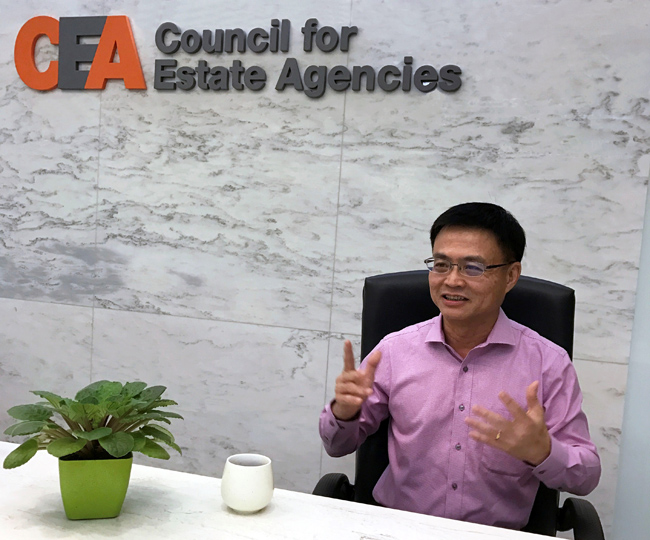It’s no secret that the real estate agency industry faces headwinds from technological disruptions, changing consumer behaviour, and rising client expectations. Executive Director of the Council for Estate Agencies (CEA) Mr Lee Kwong Weng, shares how the industry needs to transform itself to ensure longer-term business sustainability.

Here is an abridged version of Mr Lee’s interview in CEA’s quarterly e-newsletter CEAnergy:
Could you sum up in three words how the past year has been for you as CEA’s Executive Director?
Concerned. Stimulating. Appreciative.
You certainly jolted us with the first word. What are you concerned with?
My worry is that the industry may not be moving fast enough to reinvent itself and raise its level of professionalism.
Technological disruption is a foregone conclusion. Over the last year or so, half a dozen DIY portals for property transactions have sprouted up. DIY transactions in the HDB resale market have grown very quickly, and CEA’s survey also showed that more consumers are undecided about whether they will engage a property agent for their next transaction.
The industry needs to transform fast or risk becoming irrelevant. It must move from being sales-centric to being customer-centric.
It is all doom and gloom for the industry then?
Fortunately, no. Even as the DIY trend grows, there will still be a demand for property agents. However, coming generations of consumers will be better educated (and more demanding), and it is natural that they will have higher expectations of agents.
The industry must therefore identify and equip agents with the required new skill sets and updated knowledge for them to remain relevant. To stay ahead, the one important question that the industry must always ask itself is this: Are we raising our level of professionalism and transforming fast enough?
What are some of the challenges in ensuring that the industry remains relevant?
It will not be easy to overcome the inertia to change. The business structure of the real estate agency industry is unique and entrenched. The commission structure is short-term focused. The industry profile is far from homogenous. Property agents have different education backgrounds: the age profile spans from 20s to 70s, and some are part-timers.
So when we talk about transforming the industry, where and how do we start? How can the industry move from being sales-centric to being more customer-centric? How can the smaller estate agencies upgrade themselves? How can senior management in larger estate agencies take on greater accountability for their property agents to be commensurate with the share of commission they enjoy?
It is not easy to find answers to these questions. This is mentally stimulating for my colleagues and myself.
How can CEA and the industry work together to help the industry move forward?
A more systemic, longer-term solution is to ensure that property agents continue to upgrade their skills and enhance their level of professionalism, and for agencies to become more customer-centric. This is what the industry must take the lead and focus on to ensure its longer-term business sustainability, given the disruptive challenges.
In the area of training, the standards of our Continuing Professional Development courses can and must be raised. With feedback from the industry, CEA will introduce new courses on emerging topics of relevance to the industry.







